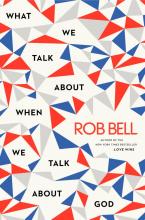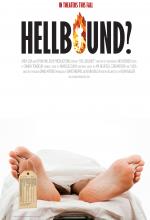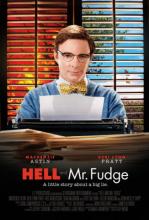rob bell

(The Controversial figure Rob Bell has created another firestorm with his latest provocative book What We Talk About When We Talk About God. Raven Foundation Education Director, Adam Ericksen and Tripp Hudgins will share our thoughts on the book in this blogalogue. We invite you to join the discussion by leaving a comment below.)
Tripp Hudgins always gets me thinking. He is right that Rob’s chapter “Open” in What We Talk About When We Talk About God is about science and religion but that it’s also not about science and religion. This is the longest chapter of the book, and it’s full of scientific information that points to the mystery of the material world. What’s the point? As Tripp states, Rob is “asking for a little humility. He’s asking for a little poetic imagination. He’s asking for curiosity.”
That’s the point of the next chapter, too. Titled “Both,” in this chapter Rob points out a major problem we have with “God-talk.” That problem is language. Tripp set me up for this at the end of his post by asking, “Are words actually enough? Ha! Write about that. Words. Words. Words.”
When I was in seminary I learned about apophatic theology, or negative theology. It tries to define God by what God is not. A 9th century apophatic theologian named John Scottus Eriugena asserted, “We do not know what God is. God Himself does not know what He is because He is not anything. Literally, God is not because He transcends being.”

This is going to be a problem. This chapter on faith and science and quantum mechanics is going to be a problem. Why? Well, because this faith and science thing has been done to death. Did you know that the Vatican has an observatory and that one of the authors of Red Shift Theory was a Jesuit? Yep. The famed Scopes Monkey Trial was more than a century ago and those of us in the Protestant Mainline have long ago made peace with it. The Vatican apologized for the oppression of scientists, most specifically it said that Galileo was right. Scientific inquiry and Biblical interpretation are not the same thing. So what's Rob's purpose for this chapter?
Well, it's manifold. He's an evangelical. He's writing in some ways to other evangelicals, specifically those who have felt cut off from the tradition. Here in the States, the classic evangelical line holds echoes of the arguments used during the Scopes Monkey Trial. Some in that Christian tradition are still fighting that fight. Heck, some progressives are, too. Powerful (if false) dichotomies have been established.
(The Controversial figure Rob Bell has created another firestorm with his latest provocative book What We Talk About When We Talk About God. Raven Board Member Tripp Hudgins and I will share our thoughts on the book in this blogalogue. We invite you to join the discussion by leaving a comment below.)
Thank you, Tripp Hudgins, for your “Open Letter to Rob Bell.” As always, you are inspirational and thought provoking. The letter provides a great introduction to our blogalogue on Rob’s latest book What We Talk About When We Talk About God. I want to emphasize one point you make and relate it to the first chapter of the book, called “Hum.”
You claim that, “This book is not about a ‘new’ thing. It’s simply about God and how we come to know God in this world.” This is such a great point because Rob isn’t making up new ways to talk about God. Throughout the book, Rob explores what God has done in the past and how God continues to pull all humans into a global future that has “greater and greater peace, love, justice, connection, honesty, compassion, and joy” (19).

This letter was written on a plane a week ago. I posted it originally on Facebook as a status update. Out of curiosity I took a gander at it again and decided I wanted to share it here. Things are so fluid on the Ol' F-Book that I thought keeping it here would be good to do. Rob's new book, What We Talk About When We Talk About God, offers someting new and something familiar all at once. What I think Rob is doing is not so much giving us new ideas (though, given some of the ecclesial silos many of us have been reared in some of these ideas might seem new). Instead, Rob is lending his voice to many Christians. His pastorally framed theology is just the kind of thing many people have been clamoring for these last several decades. My grandparents would have loved his new book. So would have their parents. I kid you not.
This book is not about a "new" thing. It's simply about God and how we come to know God in this world.

"Can we watch a video with that guy who has the weird hair and the dark rimmed glasses?" -Member of My Youth Group
"Love wins the in the sense that God’s will is the reconciliation of all things—the soul, the body, the earth, the cosmos, and everything in it." -James Wellman, Rob Bell and a New American Christianity, 59.
American Christianity is experiencing a theological shift. Many have tried to explain it, sometimes making the shift far more confusing than it actually is. Fortunately, the shift can be explained quite simply, and while it may be new to American Christianity, it is actually very old. Indeed, it dates back 2,000 years. The shift boils down to the two theological axioms of the New Testament, both found in the letter 1 John:
“God is light and in him there is no darkness at all” (1:5) and “God is love” (4:8 and 16).
Those statements, while simple, are far from simplistic. John was bold in affirming these statements. He knew he had to give it to us straight – probably because he and the other disciples had a hard time understanding what Jesus meant in his teachings and parables. So, John cut to the chase and simply claimed that Jesus reveals, “God is love and God is light. There is absolutely no darkness within God.”
Reentry is often a pain in my ass.
It's true. I get a chance to get away from it all, to spend some time with friends and begin to unwind and it's glorious. But then there's the return trip home. It always takes longer. It's like slogging through Chicago slush. Painful. Unpleasant. So, after years of dealing with this side of my personality, I've tried to develop a habit of articulating the positives of leaving.
I rise on the wrong side of the bed the day after spending time in contemplation and wonderment. It happens. I apologize to Spouse and try not to step on any toes. Rev. Crankypants is in the house.
So, to undo the crankyness, I want to thank Brother Rob for his kind attentions over the last few days. I want to thank him for letting me use his name in such a scandalous way as I have. His coattails are long. It's astonishing how using his name in such a title can bring traffic to one's blog. It's a little embarrassing, really.
Rob is a good man trying to do some radical stuff. He has a ministry to those who understand the call to be fully awake and alive in this world as a radical posture.
I was standing there on the shore, jeans rolled up, my ankles in the surf.
It was day two of the Rob Bell event and people were surfing.
Yes, surfing.
Rob brings in a couple of surfing instructors and, if you want to, you can rent a board and take a lesson. It's a good time. I watched a lot of people surf for the first time as I stood on the shore ...
watching ...
waiting.

Rob Bell,...what a jerk.
I'm spending some time with Rob Bell this week. It's reading week at the GTU and it just happened to be the same week that Rob Bell was hosting one of his "events." It's Rob and 90 other people in a room taking about Spiral Dynamics, competition in ministry, Jesus, and other things that are fun to discuss. It's a good thing. So, since the timing could not be better, I made my way down I-5 to Lauguna Beach a.k.a., "The Shire."
I'm now contemplating relocating here to finish my Ph.D.
Already, Rob has me thinking. Rob Bell is @&^*!ing with me. He's not actually singled me out, but there it is no less. He's the tallest impish human being I have ever had the pleasure to meet. Whip smart and creative, he presents a familiar, open artist's palate of the movement of the Holy Spirit. The underlying question for Rob, as he states that God redeems everything, is simply this: Are we paying attention? He speaks with such joy. He's fired up. It's good news. He's dragging me in. "Everything belongs," Rob says, quoting Richard Rohr.
What a jerk.

I first heard about the movie “Hellbound?” (coming out this fall) at Wild Goose Festival. They were offering an advance screening of the movie, and although I was just passing by the tent at the time, the subject matter stopped me where I was. A thoughtful, well-researched, accessible discussion about the history, purpose, and prospects of hell in Christian theology?
I’m in!
The film opens with reflections on September 11th, including a 10-year anniversary memorial event at the site. And as would be expected, the infamous picketers from Westboro Baptist Church were there, complete with signs bearing slogans like “Thank God for 9/11″ and, of course, “God Hates Fags.” The movie progresses to, let’s say, more educated points of view, focusing more on the front end on those who advocate for a real hell that is populated with innumerable souls experiencing eternal conscious torment.
But then the movie breaks off from the oft-quoted pro-hell camp and considers the social and historical backdrop for hell, as well as extensive screen time for the doubters and skeptics about the reality of such a place. Folks offering counters to the “traditional” evangelical view of hell include Brian McLaren, Frank Schaeffer, and an Eastern Orthodox priest, all offering fascinating tidbits meant to expand our understanding of where this modern-day understanding of hell even came from, let alone whether we claim a God who would send people there.
Mars Hill Bible Church has appointed a new teaching pastor, months after founding pastor and well-known author Rob Bell departed for California.
In an email sent on Wednesday to members of the Grandville, Mich., church, leaders announced Kent Dobson had accepted the lead position.
Dobson served as a worship director in the church’s early days and has preached as a guest speaker in the months since Bell left. He is the son of Ed Dobson, pastor emeritus at Calvary Church in Grand Rapids.

The film picks up on the recent media buzz generated by Rob Bell's controversial bestselling-book Love Wins, taking that debate into new levels of intelligence and depth.
Like any good documentary, we have the entertaining attention grabbing parts, which aren't hard to find when your topic is Hell and damnation:
We meet people at a death metal concert, take a tour through "Hell House" where actors attempt to traumatize teens into the kingdom by reenacting scenes from Columbine. Then there are the street interviews with the rather obviously mentally unstable and angry folks from Fred Phelps' church, holding their "God Hates Fags" signs and screaming at anyone who passes by.
The movie quickly moves beyond this however, delving into the deeper issues at hand. Unlike so many other Christian films, Hellbound? is neither sentimental nor sensationalist. The word that comes to mind instead is depth.

ATHENS, Ala. — Black and white. Heaven and hell. Right and wrong.
Blur or question those lines, and, well, all hell can break out.
At least it did for Edward Fudge in the early 1980s in in this small northern Alabama hamlet.
Fudge was a young preacher who also worked in his father's publishing company. When he began to teach a doctrine of hell that contradicted the traditional view of a place of eternal fiery torment for the damned, a quick succession of events cost him his job and his pulpit.
A new film, Hell and Mr. Fudge, compresses the events of the years when Fudge, now a Houston-based lawyer and internationally known Bible teacher and author, began an intensive study of the Bible and the doctrine of hell. What he found made him question one of the bedrock doctrines of Christianity.

How do you step out and take a risk — as a pastor, as an artist, as a parent, as a person — when the job description of a pioneer or a vanguard comes with the assurance of persecution?
“Surrender the outcomes,” Rob Bell told the audience at his intimate gathering, Two Days with Rob Bell, in Southern California on Tuesday.
“Surrender the outcomes of your presence, your influence, your work, your leadership,” Bell said. “They may drink the coffee. They may not. That’s just how it is. When you come to terms with this, then you’re actually free.
In other words, it’s not about you.
If, as a pastor, parent, or person, if you do what you do because you’re called to do it — without expectations, without needing a particular response, without hitching your wagon of joy to someone else’s reaction (or lack thereof) — you free not only yourself, you liberate others as well.

“Oh, a dolphin.”
The speaker, dressed in khaki jeans, a blue t-shirt and flip-flops, interrupts his train of thought about spiral dynamics and the church when some movement in the ocean a few hundred yards away on the other side of the beach house’s open briefly catches his attention.
The audience of 50 — mostly 30- and 40-something-year-old pastors, the vast majority of them men, but with at least a few young clergywomen too (a refreshing change from most evangelical gatherings of this kind) — laughs heartily and more than a few attendees crane their necks to try to catch a glimpse of a dorsal fin in the distance.
The sounds of the Pacific crashing on the shore mix with a reggae tune playing on the outdoor stereo of the bar next door as the speaker, a 41-year-old former pastor and bestselling author, resumes his riff on categories of consciousness and the spiritual practice of meeting people exactly where they are.
Rob Bell isn’t in Kansas … I mean Michigan … any more.

It’s bad enough when Christians sit silently by while LGBTQ folks are marginalized, ridiculed, abused, raped or even killed for who they are.
It’s another when Christians actively engage in the exclusion of people based on their identity or orientation.
And then there’s John Piper.
It seems Piper has a Twitter problem. Maybe he doesn’t see it as such, because with fewer than 140 characters, he can stir up quite a storm of controversy. But considering the damage that can be done with so few words, I think it is a significant problem.

Editor's Note: Rob Bell, 41, the founding pastor of Mars Hill church in western Michigan, bid adieu to his congregation in a 5,000-word epistle about grace and peace, which he preached on Dec. 18 to thousands in the converted strip mall that has housed the "Jesus community" for a decade. He said, in part:
"this church, this place, this community, was once simply a
hunch. a dream. a vision. a picture in the mind of a new kind of church for the new world we find ourselves in. a church that was fearless in confronting the injustices and systems of oppression that lurk around every corner and at the very same time deeply committed to the personal, intimate experience of following Jesus, of experiencing the joy and peace that transcends space and time. a church that found the stale, old categories of liberal and conservative boring and irrelevant because we'd experienced resurrection, which includes and affirms anything and everything that brings liberating, new life wherever it's found irrespective of whatever labels and categories it's been given because of an abiding conviction that the
tomb is,
after all,
empty.
a church where the main thing was actually the main thing."

Each year, members of the Religion Newswriters Association, the world’s premier association dedicated to helping journalists write about religion, vote on what they believe are the top religion stories of the year.
This year, more than 300 religion journalists cast their ballots in an online survey conducted Dec. 10-13, choosing the death of Osama bin Laden on May 2 in a covert operation in Pakistan by U.S. Navy SEALs and CIA operatives ordered by President Barack Obama as the top story of 2011.
See the complete list of RNA's top religion stories of the year inside.
The evangelical world expands to a far-off horizon and the topographical valleys and peaks cover landscapes that are both long and wide. Many in the media seem to have little knowledge of how large of a space the evangelical map covers. So, with this said, I welcomed Ross Douthat's thoughts in Monday's New York Times. His column, "American Theocracy Revisited," places good markers on the fears that Rick Perry and Michelle Bachmann's presidential runs are nothing more than an attempt at theocracy.
In much of the coverage of these two campaigns, the evangelical world gets flatten, stereotyped, and portrayed as only coming from one narrow point. Whether or not you agree with this view, the fact remains that any group that includes Miroslav Wolf, Jim Wallis, RC Sproul, Rick Warren, Joyce Meyers, Philip Yancy, Chuck Missler, Rob Bell, Albert Mohler Jr, TD Jakes, Amy Grant, Tony Campolo, Lucy Swindoll, Debrah Joy Winans, and so many more hues and colors of evangelicalism should not be placed in one bag and shaken into one lumpy mess, while saying that any one of their diverse views politically are the one true color. I know many will view this list and say who should or should not belong, and then justify their choices. A coherent political agenda could not be drawn from such a list of people. But following Jesus and making Jesus known in the world is at the core of each of these people's identity. Many on the list may disagree as to the best way to provide for the widows and orphans, but all would agree that we must care for them.
The other day I read some interesting statistics about how social media is shaping our lives . It is interesting to see the response to this and recognize the different ways in which we grapple with deluge of social media in relation to our faith. There are lots of resources emerging to help us maintain a strong and vibrant faith in the midst of this. I wanted to highlight a couple that I have found very useful